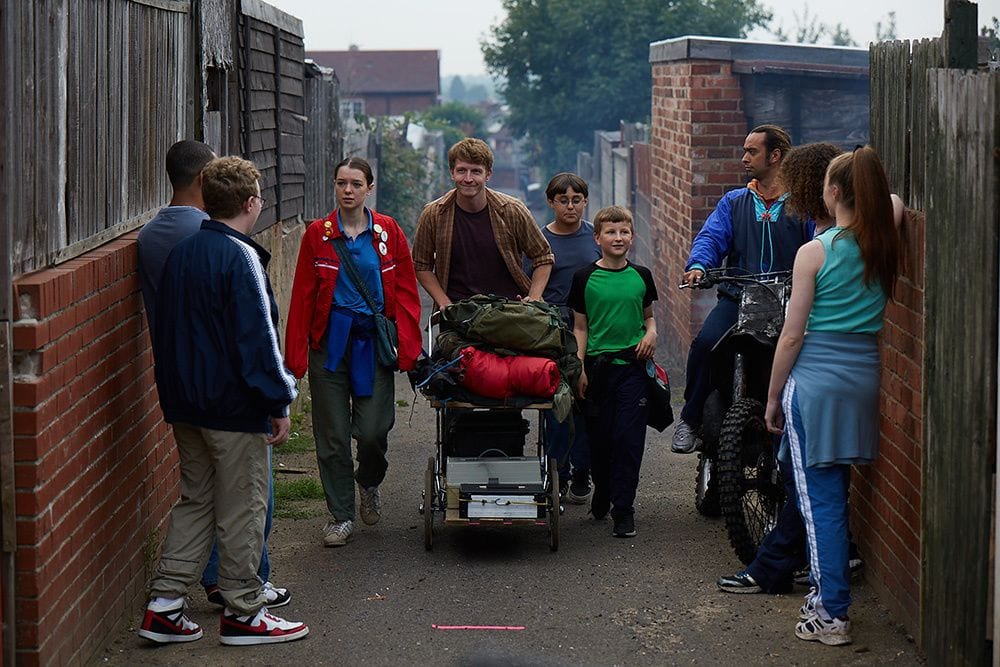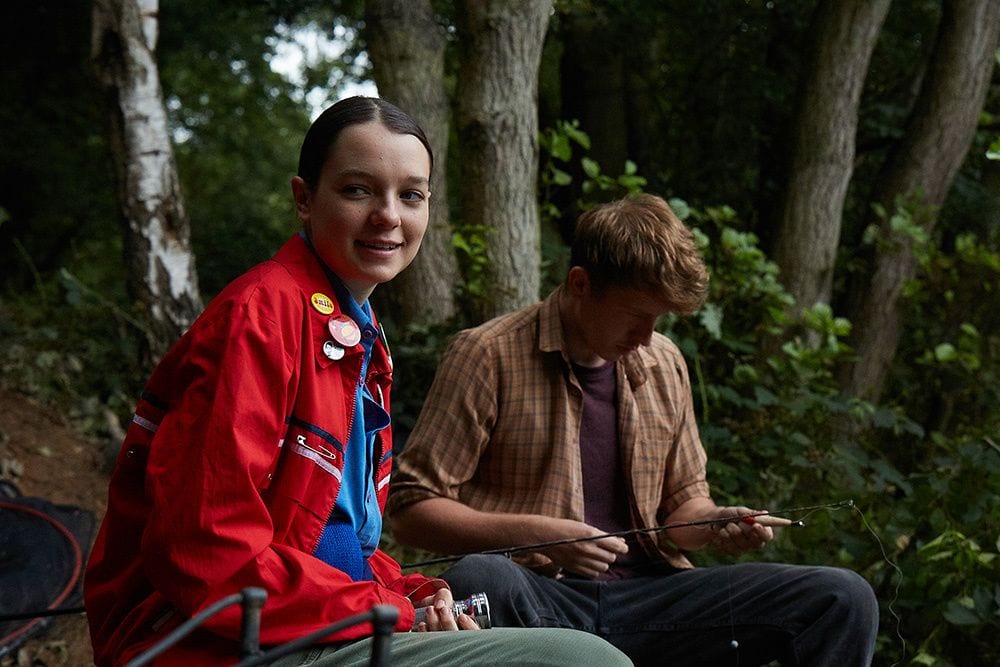
Pond Life (2018) fits into the British cinematic tradition of comedies centring on characters of post-industrial communities. Set in the summer of 1994 in the quiet ex-mining village of Edlington, a rumour stirs about Nessie, the legendary giant carp in the nearby decoy ponds. In a community of broken families, of youngsters burdened with personal struggles and the politically charged atmosphere of the time, Trevor (Tom Varey) leads his young friends and neighbours Pogo (Esmè Creed-Miles) and Malcolm (Angus Imrie) on a fishing expedition to catch Nessie.
While the coming of age comedy is Bill Blackhurst’s feature directorial debut, he has directed productions of King Lear, Hamlet, The Merchant of Venice, A Midsummer Night’s Dream, Macbeth and Romeo and Juliet at Shakespeare’s Globe. His production of Sweeney Todd, which was first performed in Pie and Mash shop in Tooting before relocating to the West End, has played for almost two years, and he recently directed an adaptation of Oscar Wilde’s The Selfish Giant at the Vaudeville Theatre.
In conversation with PopMatters, Blackhurst talks about drawing on his theatre experiences and how his desire to direct can be traced back to his childhood. He also discusses his efforts to expose the darker moments of his characters and the juxtaposition of that with the joys of friendship and summer in the cross-generational story of Pond Life.
Why storytelling as a means of creative expression? Was there an inspirational or defining moment for you personally?
As you were asking this, I was thinking back to when I was a kid. It’s quite interesting having young kids now and seeing them develop and use their imagination. The first place they want to go is to the dressing up box to imagine different characters, and it reminds me very much of myself. I’m a child of the late ’70s/’80s, and there were less of the distractions that might be around now – no mobile phones and certainly not many video games. So you just had your imagination and your pals to play with, and I remember being drawn to creating little worlds, dressing up as cowboys and stuff – all that stereotypical young boy stuff.
… I got very lucky because at my school there was a teacher who was passionate about drama, and as can be the case, an influential mentor can have such a powerful and positive effect on you as a youngster. That happened to me when, at about eleven or twelve, I became interested in drama and the written word and characters on the page. That’s it, really. I got the bug and that led me … to decide that I wanted to train to become actor, although in the back of my mind I had always had that desire to see a project through from the beginning to the end.
As an actor, you come into a process at least halfway through. Someone has had to write the piece, producers and a director have come on board, and they’ll have thought the project through from its beginnings. …I was very interested in going back to when I was a little kid, of being involved in creating the whole world. So my move from actor to director felt very natural for me, actually. I trained as an actor and then worked in a theatre, and I’ve done some TV and small parts in a few films, but my directing has predominately been in the theatre.
How has the experience of storytelling in the theatre informed your approach to the filmmaking process? And how will the shooting and editing of Pond Life filter back into your approach to directing theatre?
… My experience as an actor has definitely helped me as a director. I think mostly because I have experienced having to go through the process of unpicking a role, and trying to bring it to life off the page. I have an understanding from the inside of what that process is and the kinds of vulnerabilities you have as an actor; of those challenges. …But I like to think I understand a little bit about the patience that might be needed – what to say when, how much to say and how much to leave an actor to discover it for themselves.
In terms of going from theatre to film, one of the things that people often say is that obviously the two mediums are so different. You’re going from a bigger picture, as it were, on a proscenium arch stage into just a frame where you’re trying to fill the picture in a much more focused way, and probably with less words as well. I’ve always been aware of that, but I think that storytelling is storytelling.
… On a stage, it’s no good if the audience is looking at the wrong thing, so you are always trying to get their focus. Being streamlined and clear as a theatre director helps going into film because you are used to telling a story, and you want an audience to connect to every bit of a narrative – it’s just a slightly different way that you’re doing it on film.
Pond Life has a charm, yet as in all storytelling, it’s strongest as we are getting to know the characters. While the charm may not entirely disappear, it does fade, presenting the storyteller with the challenge of sustaining that connection with the characters.
… It’s great to feel that you have created something that has characters with charm. When I was making it, I didn’t think about that at all [laughs]. What you are trying to do is tell the story and make connections with those characters amongst each other. I guess this all starts with the words, with the script. What Richard Cameron – the writer who adapted the screenplay from his own play of the same name from back in the early ’90s – is so brilliant at is creating characters who leap off the page with their own distinct voice.
What we found when we started sending the script out to actors was that literally everyone was [saying]: “We absolutely love this script; we want to be involved.” Now that happens because a writer has hit on something, which they really connect with. These are great parts that Richard has written is what I’m basically saying. He has created roles that actors want to get their teeth into because [the characters] are beautifully formed, but they’re also real human characters. I know it sounds silly to say that, but these are young people with all the flaws, complexities, and frailties that we all have as human beings, and Richard isn’t afraid to confront those.
I guess that mix of those human fallibilities with the fun and the joy that young people have in summer hanging out with each other, that combines to make these very three dimensional characters. And more importantly, it creates something that actors can really get their teeth into and play with, to riff with, and that’s what I was really interested in. But in terms of casting, what we were very careful with was finding actors who could connect with these characters, and were able and willing – or up for just expanding and developing them to some degree – and that’s what Richard’s writing allows for so beautifully.
Just when you think you may have a handle on the characters, their private moments reveal their vulnerability. It’s not necessarily that they are flawed, but they are made up of layers, and they act differently when around others.
… I certainly would never want to spoon feed an audience; I think it’s really important to leave things unexplained. It’s in the writing but I also feel that when we started shooting it, we found more and more moments where we’d say: “Let this just happen; let this just play out; let us sit in this moment for a second and see these characters behaving in this amazing landscape, just being.” There’s so much you can take away from these private moments, and that’s human. As you say, we all behave, perhaps even unknowingly differently in different circumstances depending on who we are with.
Thinking back to my adolescence, there is sometimes an uncertainty at certain ages, a discomfort, perhaps, in what your place is in this world and where you may be heading. And yet with this group of kids, as I leave them to talk about that, they just have these little private moments, as you say, that are perhaps slightly darker for them. I find that interesting, and I was keen to draw that out, and I’m pleased you felt that worked.
While these characters are burdened with angst, there’s a freedom to that period of adolescence because, at that age, we are not yet fully responsible for ourselves. Perhaps this is a time we don’t fully appreciate until we encounter the burdens of adulthood, and therein Pond Life will resonate differently with audiences, depending on one’s age.
The screenings we have had so far, we have had a real cross section of ages in the audience. I have been thrilled to see folk in their seventies or eighties who have connected with it. Last night we had a screening in London with quite a few teenagers, and I was particularly surprised that the younger ones loved it. …I remember 1994 very well, but it was twenty-five years ago. It’s a lifetime ago for so many people watching [ Pond Life], but for these kids, it’s a timeless piece because they are going through and experiencing life in the way that we all have done as adolescents – similar complexities, fears and hopes, and similar desires to just go out and be kids.
The one thing I loved when I read the script was this story is set in a community that has had a devastating time in recent years, and that is not the story that Richard chooses to concentrate on, although it is referenced at points. Essentially, these are young people who – no matter what life throws at them – are determined to go out and pursue their childhood, to claim that and to live their life as fully as they can. That is inspiring and for young kids now watching it – a few whom I spoke to last night – once they get over the weirdness of not seeing a mobile phone in the first five minutes [laughs], they almost felt envious that these kids didn’t have that distraction [laughs].
I’m thinking back to my childhood in London in the eighties and just being able to go out and play all day, and then come back again without health and safety, or security concerns. It’s not even considered in such a way that it is now, and so for older people watching it, there’s certainly a sense of nostalgia that’s also connecting with what we all felt as adolescents – of wanting to be our own people, to find out who we are and where we belong in this complex world. That’s a universal and timeless story, and that’s why I think [ Pond Life] is cross-generational as a piece of cinema. I hope it is anyway, and it has certainly felt that way so far with the people who have responded to it, of all ages.




